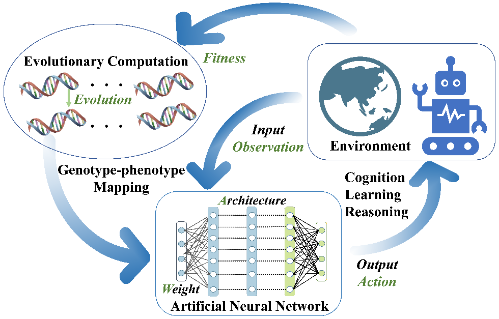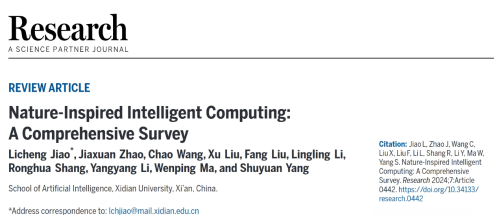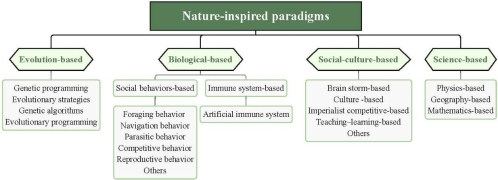
-
Latest Review by Professor Jiao Licheng's Team at Xidian University: Nature-inspired Intelligent Computing: A Comprehensive Survey
2024-08-22


Recently, Professor Jiao Licheng's team at Xidian University conducted a comprehensive and in-depth review of the development and challenges in nature-inspired intelligent computing. This review, titled "Nature-Inspired Intelligent Computing: A Comprehensive Survey," has been published in Research.
Citation:
Licheng Jiao, Jiaxuan Zhao, Chao Wang, Xu Liu, Fang Liu, Lingling Li, Ronghua Shang, Yangyang Li, Wenping Ma, Shuyuan Yang. Nature-Inspired Intelligent Computing: A Comprehensive Survey. Research. 2024;7:0442.DOI:10.34133/research.0442
1. Research Background
The complexity of species in nature often exceeds human understanding, providing a rich source of inspiration for emerging disciplines and technological fields. For centuries, philosophers and scientists have studied and modeled these natural phenomena to create increasingly complex artificial intelligence systems, leading to the development of diverse nature-inspired intelligent computing paradigms. These paradigms, by emulating natural processes, effectively address complex real-world problems and serve as a bridge between natural sciences and artificial intelligence. They typically possess characteristics of the natural world, such as randomness, nonlinearity, ergodicity, self-organization, adaptability, diversity, stability, and high parallelism, making them indispensable tools across various fields in the real world.
2. Research Progress
Professor Jiao Licheng's team conducted a systematic review of the latest developments and challenges in nature-inspired intelligent computing paradigms, starting from the underlying mechanisms. The team summarized the natural mechanisms behind various advanced nature-inspired intelligent computing paradigms, which provide crucial guidance for developing general artificial intelligence capable of autonomously adapting to different environments. Based on these natural mechanisms, the team categorized the nature-inspired intelligent computing paradigms into four major types: evolution-based, biologically-based, socio-culturally-based, and scientifically-based paradigms.

Figure 1. Nature-inspired intelligent computing paradigms are divided into four categories: evolution-based, biological-based, social-cultural-based, and science-based.
This review provides a detailed explanation of the relationships between nature-inspired intelligent computing paradigms and their corresponding natural mechanisms, analyzing the characteristics of different paradigms and revealing the fundamental principles and design methodologies behind paradigms. This analysis not only aids in understanding the operational mechanisms of various paradigms but also offers new perspectives for future algorithm design. The review systematically summarizes the design principles and mathematical updates of classic paradigms, clarifying the commonalities and differences between them, and providing a foundation for addressing the unreasonable "metaphor". Additionally, the review examines typical case studies of these paradigms in practical applications, further validating their effectiveness in solving complex problems and highlighting their importance in real-world scenarios.
3. Future Outlook
Although the nature-inspired intelligent computing paradigm originated from diverse theories, it has developed its own unique trends over the decades. Nature-inspired intelligent computing paradigm presents innate advantages in solving real-world problems due to their parallelism, ease of expansion, and non-linearity. By reviewing classical nature-inspired intelligent computing paradigms, this survey summarize the top ten potential future research directions and challenges, including: new extensions of nature-inspired paradigms, integration with the nervous system, genotype-phenotype mapping, large-scale problem, multi-objective optimization, multi-task learning and optimization, parallel distributed computing, trusted federated learning, automatic learning, and biologically-inspired intelligent robotics.

Figure 2. Challenges of the nature-inspired intelligent computing paradigm and potential future research directions.
The development of general artificial intelligence offers new opportunities to address these challenges. Thanks to their flexible adaptability, nature-inspired intelligent computing paradigms can be integrated with advanced large models, such as ChatGPT, to achieve collaborative optimization. Drawing on lessons from nature, these synergistic mechanisms are expected to foster the emergence of more adaptive and efficient AI systems.
Tag: Artificial Intelligence
Sources: https://spj.science.org/doi/10.34133/research.0442